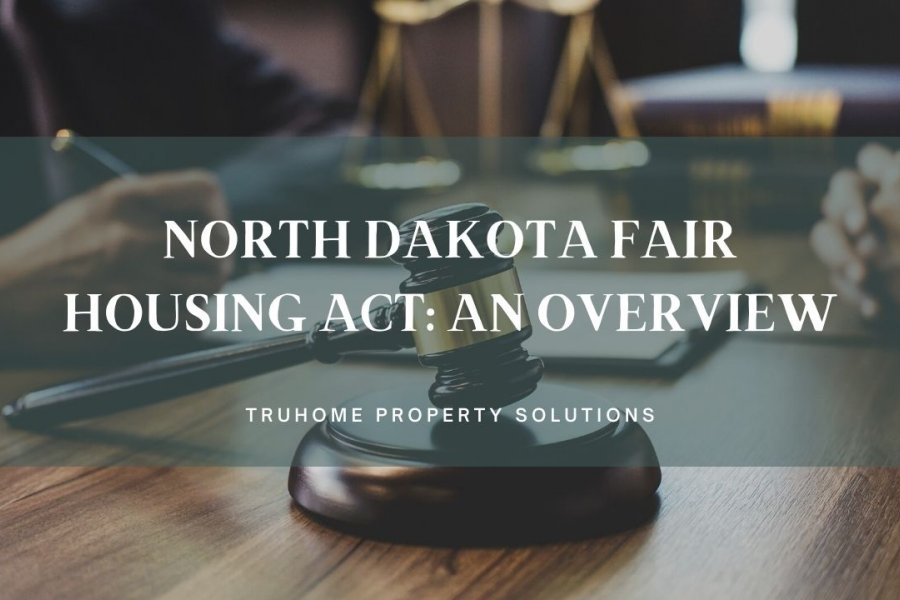
When renting out your North Dakota home, it’s vital to know and follow the Fair Housing Act. More often than not, a violation of the law is entirely accidental, and this can cause legal issues for landlords due to discimination.
TruHome Property Solutions has outlined the basics of North Dakota’s fair housing laws so you can rest easy!
Why Do We Have the Fair Housing Act?
Enacted in 1968, the Fair Housing Act prohibited discrimination on the basis of race, color, religion, and national origin. Sex was added as a protected characteristic 6 years later. 1988 also saw the addition of two protected classes: disability and familial status.
The 1968 act came about as an offshoot of the Civil rights movement. It had meaningful mechanisms to fight housing discrimination. Before this, courts were responsible for settling discrimination complaints and they handled them on a case-by-case basis.
Every person has a right to be treated fairly and equally, minimizing housing discrimination as a result. Congress enacted the act to ensure that landlords, lenders, and home sellers engage in fair housing practices.
Who Does the Fair Housing Law Protect?
At the federal level, only 7 protected characteristics exist for housing: race, color, sex, religion, disability, national origin, and familial status. Some individual states have also passed legislation to expand on this list.

The following are the protected characteristics in North Dakota under state law:
- Race
- Sex
- National origin
- Marital status
- Disability
- Religion
- Color
- Age
- Familial status
- Receipt of public assistance
- Status as a domestic violence victim
What Are Some Examples of Acts That Can Pass Off as Discriminatory?
As a landlord in North Dakota, the following are acts that you must stay away from under state law:
- Creating a rental ad that shows a preference or limitation to a particular class of people, for example, stating “Americans only”
- Falsely denying the availability of a unit to people of certain characteristics
- Having different tenant-qualifying standards or security deposit amounts for different classes of people
- Setting different terms and conditions for existing tenants. For instance, allowing some to have pets and not others
- Failing to provide reasonable accommodations to people with disabilities
- Trying to terminate a lease agreement based on a discriminatory reason. Ending the lease for reasons not stipulated by the North Dakota landlord-tenant law would be unlawful
What State Agency in North Dakota is Tasked with Enforcing the Fair Housing Laws?
The state agency responsible for the enforcement of the act is the North Dakota Department of Labor and Human Rights . The agency is responsible for the following in terms of fair housing law:
- Receiving and investigating complaints of unlawful discrimination in North Dakota housing
- Issuing a report that recommends legal action against people found to be culpable
- Cooperating with other law entities that are also working to eliminate or prevent housing discrimination in North Dakota
- Fostering prevention of housing discrimination through educating relevant stakeholders, including landlords, lenders, brokers, realtors, and sellers, on their rights and responsibilities
Does the North Dakota Fair Housing Act Make Any Exceptions?
Yes, some exceptions to the law do exist for North Dakota. These are:
- Religious organizations. Some religious organizations may give preferential treatment to people professing the same religious faith. This is not discrimination, as there is a direct correlation between characteristics and the organization. That notwithstanding, the preferential treatment shouldn’t be restricted based on characteristics such as color, race, or national origin. These are still protected

- Private clubs. The North Dakota Department of Labor and Human Rights also exempts people belonging to private clubs, who may give preferential treatment to their members. The membership, however, shouldn’t be restricted on grounds of race, color, or national origin
- Elderly housing. Housing set aside for the elderly is also exempt from the age and familial status provisions of the North Dakota law
What Happens to Violators of the Act?
Any person found to have violated the North Dakota Fair Housing laws may be liable for:
- Paying actual damages to the complainant
- Paying attorney and court fees for the suit
- Paying civil penalties to the state. These can range anywhere between $16,000 and $70,000, depending on the specific offense
How Can Landlords in North Dakota Avoid Discrimination Accusations From Their Tenants?
As a North Dakota landlord, you have various fundamental responsibilities under the statewide landlord-tenant law. One such responsibility is ensuring that you abide by the Fair Housing laws or else risk illegal actions that could harm your rental investment. These are some of the things you can do to stay on the good side of the law:
- Have a consistent tenant screening process . Use the same qualifying criteria for all tenants. For example, if you require a credit report from a Hispanic tenant, do the same for all other tenants as well
- Ask the right set of questions. It’s normal for landlords to inquire about details from prospective tenants. That being said, not all questions are created the same. Some can go against the provisions of state law. You want to avoid questions like: where are you originally from? How many kids do you have? What kind of disability do you have? Where do you go to church? Are you Black? Again, questions about housing based on race, color, religion, national origin, and all the other above-mentioned characteristics are off limits by law

- Advertise your North Dakota unit the right way. Focus more on describing the features your unit has rather than the type of tenant you want. Avoid the following statements: “Ideal for a Single Professional,” “Perfect for a Female,” “Hispanic Residence,” “Catholics Only,” “No Children,” “Not Suitable for Seniors,” “Bachelor Pad”
Bottom Line
As a landlord, it’s your duty to abide by the Fair Housing Laws. When you’re aware of the protected classes and the details behind these laws, you can conduct your rental business with much more confidence and avoid legal trouble.
If you’d feel better passing on this responsibility to someone with experience who knows the landlord-tenant laws down to the last detail, contact TruHome Property Solutions today! We’d be happy to help you.
Disclaimer: This post is only meant to be informational and not a substitute for legal advice. If you have a specific question, kindly get in touch with a qualified attorney or an experienced property management company like TruHome Property Solutions directly.

